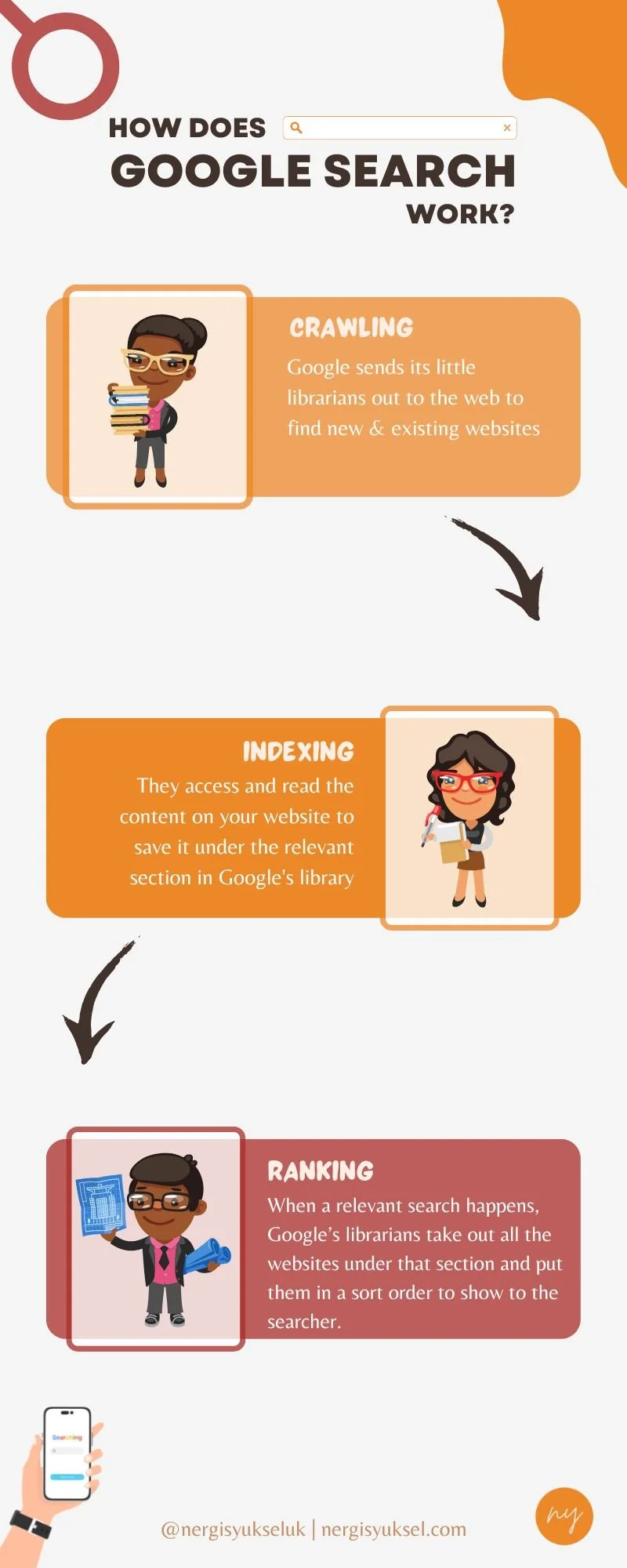What Is SEO & How Does Google Search Work?
Here we go - my first ever blog post on SEO for small businesses! With this blog article, I’m going to explain what we mean by SEO in simple words.
As a small business owner or a solopreneur, you probably hear about SEO a lot. You may be thinking it’s about blogging or keywords, but not entirely sure what it means. Here’s your no-tech, simple explanation of SEO.
What do we mean by SEO?
SEO, in other words, search engine optimization, is an artful process of making your website search engine friendly. When I say search engine friendly, I’m mostly referring to Google, as it’s the most popular and used search engine out there. Of course, there are other search engines such as Yahoo!, Bing and Duck Duck Go. You can even think about Pinterest and Instagram as search engines since you make a search to find relevant content.
In this post, I’m going to talk about Google, but you can apply the information to any search engine out there.
How does Google Work?
To recap, search engine optimization is the process of making your website search engine friendly so that when someone makes a search about your services, your website comes up on search results. But to understand how we do that, first, we need to understand how Google works.
I would like you to think of Google as this huge online library with lots of librarians. Google calls them bots or spiders, I call them Google’s little librarians. When you read about SEO, you may come across phrases such as spiders/bots crawling the web. When I think about SEO, I imagine little busy librarians trying to find new resources every day to keep Google’s library up-to-date, which is what bots crawling the web means.
Google sends these librarians out onto the online world every second of the day to find new and existing websites. How do they do this, you may ask - simply by jumping from link to link.
Technical SEO
When these librarians (or bots/spiders) come across a new link and find a new website, they need to be able to access, read, and save it. You having a website and humans being able to access and read your website, doesn’t necessarily mean that Google can actually find, access and read your website. And this is pretty much all about how your website has been created and what’s happening at the back end, which we call technical SEO.
If you’re using a content management platform such as WordPress or Squarespace, you usually don’t need to think about the technical side as much. These all-in-one website platforms are usually pretty good at making your website accessible to Google.
On-page SEO
Google’s librarians save your website in their library under a certain section to show it to the people when a relevant search happens. To be able to do that, they need to be able to understand what your website is about, what services you are offering and to who is it relevant. This is mainly related to your on-page SEO, in other words, any element you have on your page such as the content you have, and how good and useful it is. We use certain clues such as page titles, keywords and internal links to make sure it is super clear to Google.
When Google decides what your website is about, it saves your website under a specific section alongside many other websites. When a relevant search happens, Google’s librarians take out all the websites under that section and put them in a sort order to show to the searcher. And this is when your website gets a certain rank for particular keywords.
Apart from trying to understand what your website is about, Google also tries to understand how authoritative or knowledgeable you are in your area. Remember, Google’s whole aim is to show the most useful and reliable content to the searchers so that they find the answer they are looking for.
Backlinks
One of the ways Google tries to figure out your authority and knowledge in a certain topic is through backlinks. A backlink is an external link that you receive from another website, such as a wedding planner linking out to a specific photographer’s page.
Think of backlinks as a real-life mouth of referral. If you’re looking for a yoga studio and your friend recommends Studio A, you will automatically trust that studio is going to be good. It's similar with backlinks. If a website Google already likes and trusts links back to your website, Google will think that your website is good and trustworthy enough. The more websites refer you to Google, the more authority you gain.
There are a lot of ways you can get backlinks from other websites, but that’s a topic for another blog post!
So to summarise, SEO has three main areas: technical SEO, on-page SEO and backlinks (in other words, off-page SEO). When all these three areas come together nicely, Google will start ranking you on page one.
As a small service-based business, you don’t really need to worry about the technical side, especially if you’re using one of the known and trusted website platforms.
Initially, I would like you to focus on your on-page SEO - what content you’re putting out there and how to show Google clearly what your business is about and who you are targeting.
Backlinks usually come at a later stage, when you’re ready to work on digital PR. And as you start building connections with other suppliers or writing good content, you will naturally start getting backlinks to your website.
Here it is! Your simple, no-tech explanation of what we mean by SEO and how Google works.
I hope it’s all clear and you find it useful. If you have any questions or if there’s anything that doesn’t make sense to you, please do get in touch with me.
Your mindful SEO consultant,
Nergis xx



